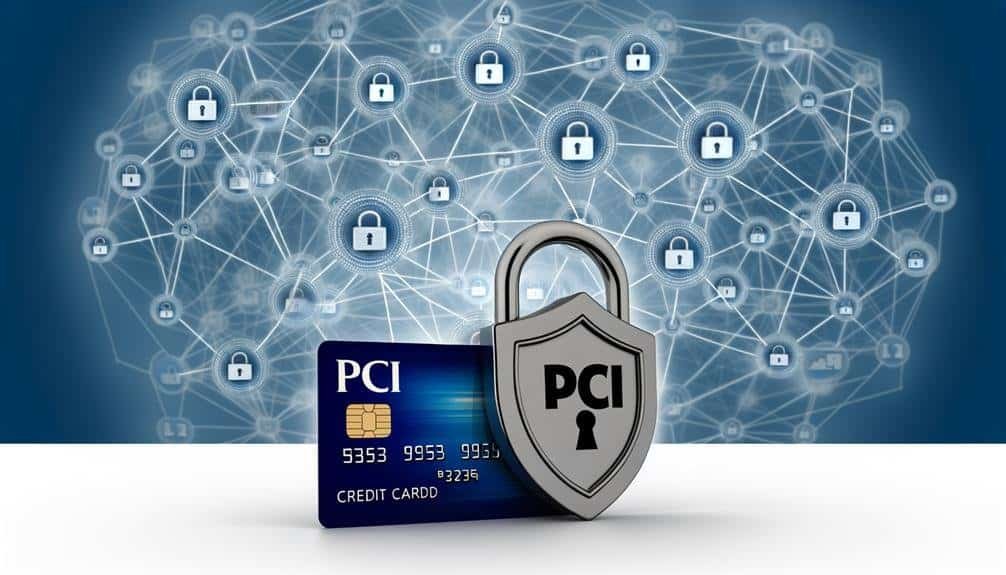Why Is PCI Compliance Important?
You may not realize it, but every time you swipe your credit card or make an online purchase, you are entrusting your sensitive information to businesses.
With the ever-growing threat of cyberattacks, it’s crucial for these businesses to prioritize PCI compliance.
Why, you ask? Well, the consequences of neglecting this important aspect of data security can be catastrophic. From financial losses to damaged reputation, the stakes are high.
But fear not, for in this discussion, we will explore the reasons why PCI compliance is not just important, but absolutely essential for businesses of all sizes.
So, buckle up and get ready to uncover the hidden dangers and invaluable benefits of PCI compliance.
Key Takeaways
- PCI compliance is crucial for protecting customer data and preventing data breaches.
- Maintaining a strong reputation for data security builds customer trust and loyalty.
- Non-compliance with PCI standards can result in hefty fines, legal consequences, and damage to a brand’s reputation.
- Investing in PCI compliance ensures business continuity, risk management, and a competitive advantage.
Protecting Customer Data
To protect your customers’ sensitive data, it’s crucial to prioritize PCI compliance.
Customer privacy and secure transactions are at the core of PCI compliance. By adhering to the Payment Card Industry Data Security Standard (PCI DSS), you ensure that your customers’ personal information is kept safe during payment transactions.
PCI DSS sets forth a comprehensive framework that outlines the necessary security measures for handling cardholder data. This includes encryption of sensitive data, regular vulnerability scanning, and secure network infrastructure.
Compliance with PCI DSS not only protects your customers’ privacy but also helps build trust and confidence in your business. It demonstrates your commitment to safeguarding their information, reducing the risk of data breaches, and maintaining the integrity of your business operations.
Preventing Data Breaches
By implementing robust security measures, you can effectively prevent data breaches and protect your customers’ sensitive information. Data breach prevention is a critical aspect of maintaining the trust and loyalty of your customers. Here are four cybersecurity measures you should consider implementing:
- Encryption: Encrypting sensitive data makes it unreadable to unauthorized individuals, reducing the risk of data breaches.
- Access controls: Implementing strong access controls ensures that only authorized personnel can access sensitive customer information, reducing the chances of unauthorized access.
- Regular security assessments: Conducting regular security assessments helps identify vulnerabilities and weaknesses in your systems, allowing you to address them promptly and prevent potential data breaches.
- Employee training: Educating your employees about cybersecurity best practices and the importance of data protection can significantly reduce the risk of human error leading to data breaches.
Building Customer Trust
Building customer trust is essential for businesses to establish long-lasting relationships and foster loyalty. Reputation management plays a crucial role in building this trust.
By maintaining a strong reputation for data security and compliance with PCI standards, businesses can assure their customers that their personal information is safe. This reassurance not only helps businesses retain existing customers but also attracts new ones.
Additionally, being PCI compliant gives businesses a competitive advantage over their non-compliant counterparts. Customers are more likely to choose businesses that prioritize their security and take measures to protect their sensitive data.
Avoiding Costly Penalties
Maintaining PCI compliance is crucial for businesses to avoid costly penalties and legal consequences related to data security breaches. Non-compliance can lead to severe financial repercussions and potential legal action.
Here are four reasons why avoiding costly penalties is essential:
- Financial Loss: Failing to comply with PCI standards can result in hefty fines and penalties imposed by regulatory bodies, such as the Payment Card Industry Security Standards Council (PCI SSC).
- Reputational Damage: Non-compliance can tarnish your brand’s reputation, leading to a loss of customer trust and potential business opportunities.
- Legal Consequences: Non-compliant businesses may face lawsuits, litigation costs, and settlements, further adding to the financial burden.
- Operational Disruptions: Non-compliance can result in business disruptions, including the suspension or termination of payment processing services, impacting revenue streams and customer satisfaction.
Ensuring Business Continuity
To ensure uninterrupted operations, businesses must prioritize maintaining PCI compliance. In today’s digital landscape, where data breaches and cyberattacks are becoming increasingly common, it is crucial for organizations to have robust disaster recovery and risk management plans in place. PCI compliance plays a vital role in ensuring business continuity by mitigating the risk of data breaches and protecting sensitive customer information. By adhering to PCI standards, businesses can implement strong security measures, such as encryption and access controls, that help prevent unauthorized access to payment card data. This not only safeguards the integrity of customer data but also helps maintain customer trust and confidence in your brand. Investing in PCI compliance is an essential step towards ensuring the ongoing success and sustainability of your business.
| Disaster Recovery | Risk Management | Business Continuity |
|---|---|---|
| Data backups | Risk assessments | Continuity planning |
| Redundant systems | Incident response | Testing and training |
| Offsite storage | Vulnerability scanning | Communication plans |
| Regular testing | Encryption | Incident management |
| Employee training | Access controls | Ongoing monitoring |
Conclusion
So, in conclusion, it’s crucial for your business to prioritize PCI compliance.
By doing so, you can safeguard your customers’ sensitive data, prevent data breaches, and build trust with your clientele.
Additionally, you can avoid costly penalties and ensure the uninterrupted operation of your business.
Remember, staying compliant isn’t only a legal obligation but also a strategic move that sets you apart from your competitors and demonstrates your commitment to protecting your customers’ information.






